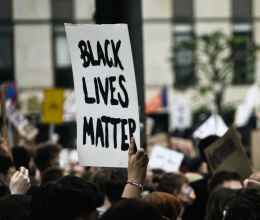
In early April, an ordinance was introduced at a Summit City Council meeting that would prohibit camping or sleeping on public property, including streets, sidewalks, parks, and benches. Any person found violating the ordinance could face up to $2,000 in fines and 90 days in jail.
During a following meeting on April 22, the ACLU-NJ joined advocates and community members voicing their outrage about the ordinance, urging the council to instead invest in moral policies grounded in compassion, rehabilitation, and support of unhoused communities.
Together, our testimony emphasized the ordinance’s lack of humanity and criticized the council members’ disregard for their obligation to support all people within their jurisdiction. We made it clear that for the city council to address homelessness humanely, members must instead focus on ensuring easily accessible shelters and resources for those experiencing homelessness, not further criminalizing vulnerable people.
As a result of strong community organizing and collaboration, the Council postponed their planned vote on the ordinance. This was a victory for advocates and community members, but the Council could move the ordinance back on the agenda at any time.
The Summit ordinance follows a similar motion in Paterson, which was rescinded after public pushback. Because of the powerful voices of community members, many of whom have experienced homelessness, the ordinance was removed from consideration.
The withdrawal of the Paterson ordinance represents the power of community-led advocacy and the potential for inclusive change, especially when government stakeholders listen to those they are meant to serve. This victory was a meaningful moment for the people of Paterson, but it should never have had to happen in the first place – the introduction of these motions signals an alarming trend of attempts to punish those experiencing homelessness in New Jersey.
Time and time again, it has been shown that criminalizing homelessness does nothing to prevent it. Alternatively, policies aimed at providing emergency shelter and services to support stability are more effective while also requiring less funding.
It is crucial that New Jersey towns support unhoused communities by prioritizing care and rehabilitation, not criminalization. The Summit ordinance fails to provide tangible solutions or support and would instead cause damage to people’s lives.
Like we did in Paterson, we’re calling on Summit’s City Council to invest in community programs that build affordable housing, provide access to health care, and support income opportunities.
Imposing criminal penalties on unhoused people sleeping in public spaces is inhumane, ineffective, and immoral. Vulnerable people in need should be met with stable and safe housing and shelter options, not time in a jail cell.
People who are unhoused deserve respect – not punishment.




